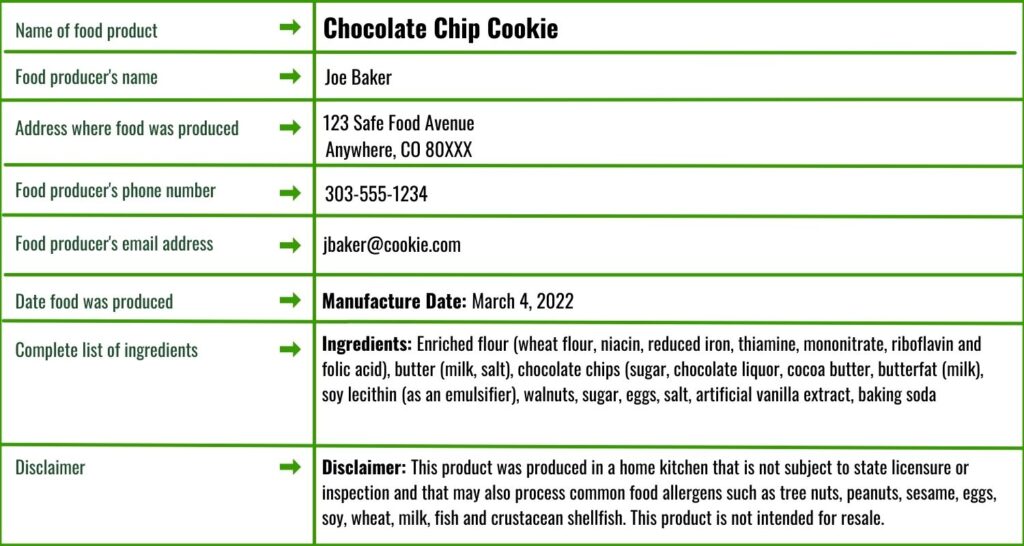Fruit preserves are preparations of fruits and often sugar, canned in jars for long-term storage. In general, these products are produced by boiling mashed or chopped fruit with sugar and water. The proportion of sugar and fruit varies according to the type of fruit and its ripeness. Jams, jellies, preserves, and certain fruit butters are considered non-potentially hazardous foods under the Colorado Cottage Foods Act and can be sold as a cottage food.
Potential Products
Jam
Made from crushed or chopped fruit cooked with sugar, and often pectin and lemon juice. Jam can be a puree of fruit or have a soft pulp, but it does not contain chunks of fruit.
Jelly
Generally made by cooking fruit juice and sugar with pectin as a jelling agent and lemon juice as an acid to maintain a consistent texture. Jelly is firm and will hold its shape; generally, jelly contains no pieces of fruit.
Preserves
Fruit cooked with sugar to the point where large chunks of fruit or whole fruit, such as berries, are suspended in a slightly gelled syrup base. The texture of preserves is not smooth like jelly or jam.
Marmalade
Soft jelly, often citrus-based, that includes both the flesh and peel of the fruit suspended throughout the jelly base.
Fruit Butter
Made by cooking fruit pulp to a thick consistency, often with spices added. Note: only certain types of fruit butters can be sold as cottage foods.
Packaging
Standardized canning jars are recommended due to their ability to withstand processing temperatures. All cottage food products must display the information required by the Colorado Cottage Foods Act and outlined by the Colorado Department of Public Health and Environment.
Food Safety Concerns
Jams, jellies, preserves, and fruit butters are products characterized by low water activity and natural acidity. Since they are also packed at high temperatures, they are not likely to harbor harmful foodborne illness organisms. Processing times and temperatures must be adjusted for altitude and be sufficient to destroy harmful microorganisms. The modern preparation of fruit preserving often involves adding pectin as a gelling agent, although sugar or honey may be used. Sweeteners have a function in the safety of fruit spreads and changing the amount could have detrimental effects on safety and quality.
QUESTIONS:
Q: Can I make pumpkin butter?
A: No. Due to the density and variation among home-prepared pumpkin purees, there is no safe process available for making pumpkin butter from canned puree.
Q: Are canned fruits or vegetables allowed?
A: Canned fruits are allowed if they are packed in syrup, but not allowed if they are packed in water. Canned vegetables are not allowed because they exhibit characteristics that would allow for the growth of microorganisms, such as a pH above 4.6 and low levels of sugar.
Resources
- National Center for Home Food Preservation: http://nchfp.uga.edu
- CSU Extension: http://extension.colostate.edu
Colorado Cottage Foods Act
Colorado Senate Bill 12-048 allows individuals to produce, sell, and store a limited number of specific, non-potentially hazardous ‘cottage food’ products, in a home kitchen. Cottage food businesses require no license or permit from the Colorado Department of Public Health and Environment and are not inspected by any state or local government entity. Products must be sold directly by the cottage foods operator to an informed end consumer and gross sales for each product produced must not exceed $10,000 annually. Sales outside of the state of Colorado are prohibited.
Allowed Cottage Food Products in Colorado
A limited range of foods that are non-potentially hazardous and do not require refrigeration are allowed. These foods include spices, teas, dehydrated produce, nuts, seeds, honey, jams, jellies, preserves, fruit butter, flour, baked goods including candies, fruit empanadas and tortillas, and pickled fruits and vegetables.
General Labeling Requirements
A cottage food operation may only sell products offered with a label containing the following information (printed in English):

Food Safety Training
Although a cottage food kitchen does not require licensure, the producer does need to obtain food safety training. The Colorado Cottage Food Act requires “a producer must take a food safety course that includes basic food handling training and is comparable to, or is a course given by, the Colorado State University Extension service or a state, county, or district public health agency, and must maintain a status of good standing in accordance with the course requirements, including attending any additional classes if necessary.”
Trainings that CSU Extension offers include face-to-face as well as online classes, varying in length and cost. Contact your CSU Extension county office for more details: http://extension.colostate.edu. For information on class offerings near you, visit: https://foodsmartcolorado.colostate.edu/food-safety/cottage-retail-foods/.
Resources
Colorado Department of Public Health and Environment: http://cdphe.state.co.us and Colorado Farm to Market: http://cofarmtomarket.com

